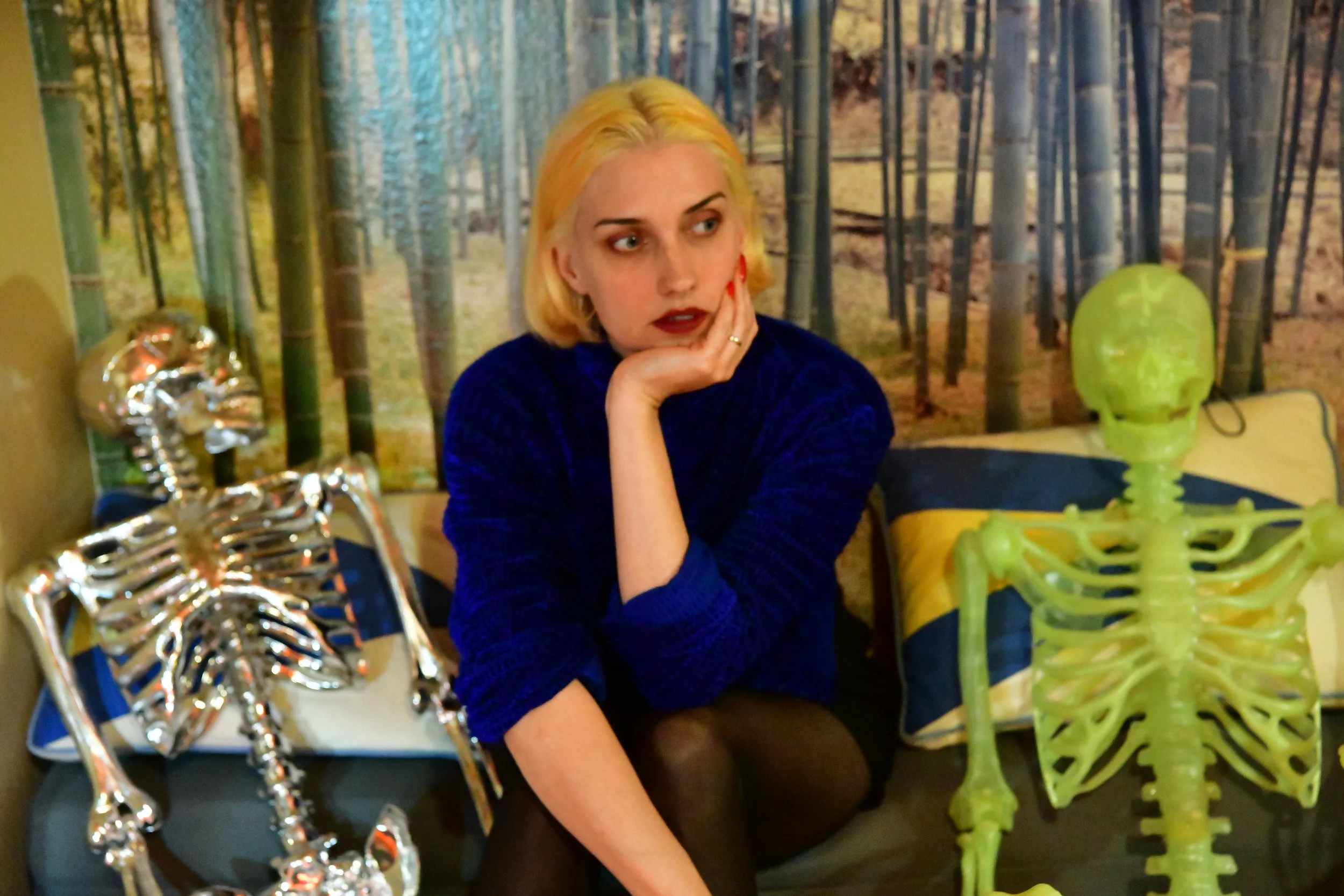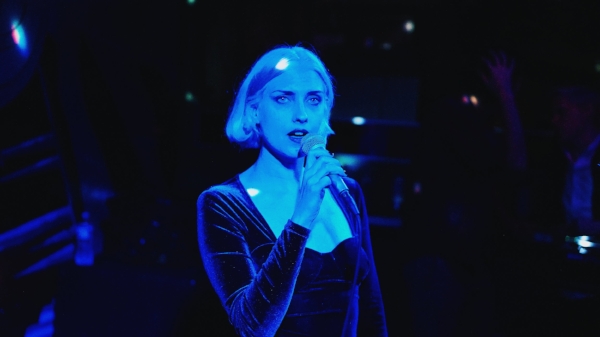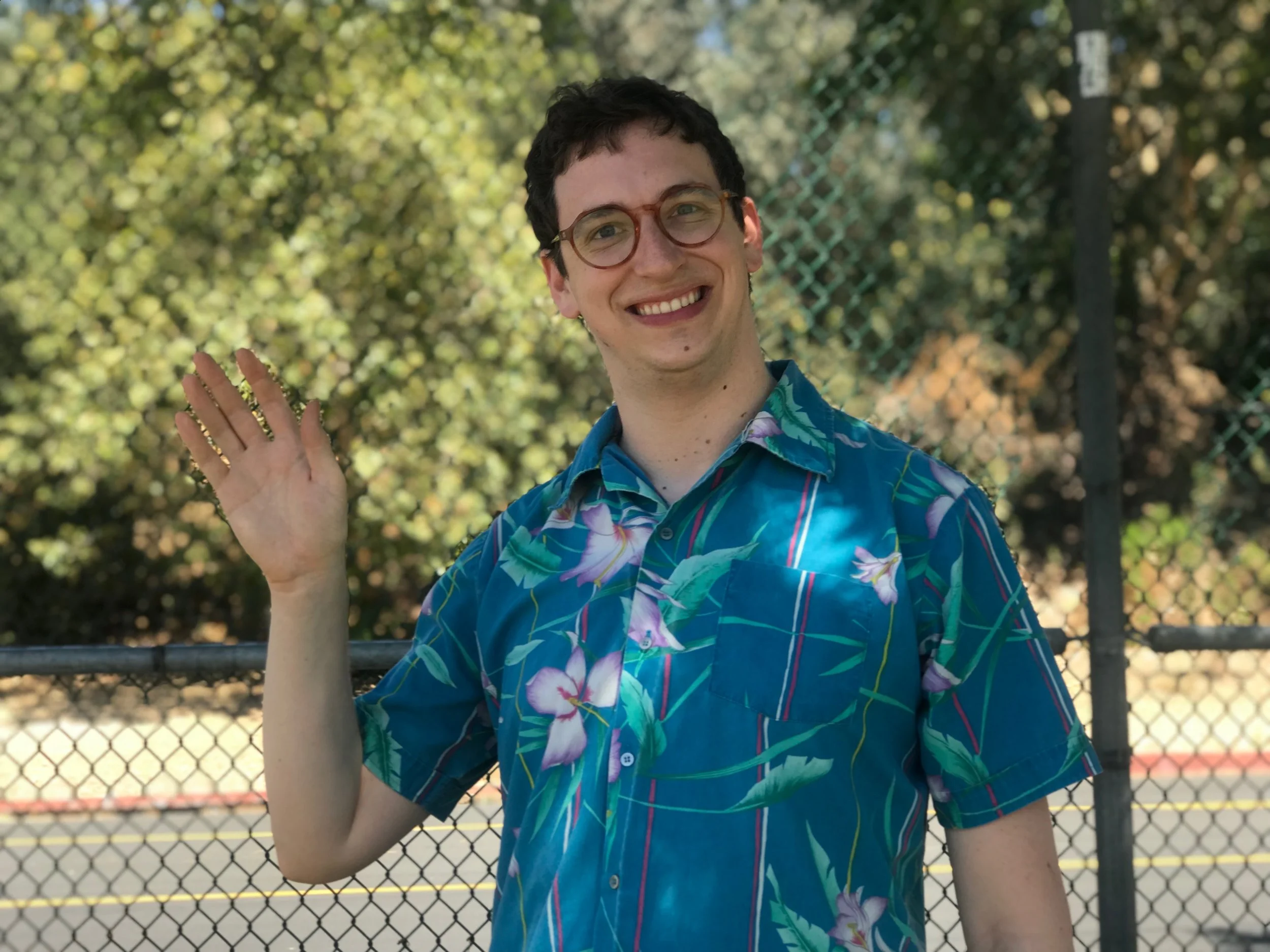Molly Nilsson on New Album Twenty Twenty, The Importance of Context, and Excitement for the Next Decade
Molly Nilsson has spent the last decade diligently and independently creating and releasing her remarkable introspective music into the world. Consistently adding to her important and ever-growing body of work, Nilsson’s efforts have been rewarded with an international underground following appreciative of her uncompromising artistic vision. Needless to say, we here at WMF have long hoped to connect with Molly and document a conversation, but with her base of operations in Berlin (including home studio Lighthouse and self-run label Dark Skies Association), opportunities for us to cross paths with her have been few and far between.
Quite understandably then, we jumped at the recent opportunity to see Molly Nilsson perform rare shows in Los Angeles and San Diego. And just as infrequent as Stateside performances are with Nilsson, so too are interviews with the Swedish artist. It was consequently with great pleasure and gratitude that we sat down with Molly on a November evening in Los Angeles to discuss her new album Twenty Twenty, the boundaries of language, the importance of context, and looking beyond hope into a new a decade.
Bobby Weirdo: It’s interesting to see that you have such enthusiastic fans here in Southern California who have found your work either online or some other way. You’re not that engaged in social media and you run your own record label without the backing of big music industry machinery.
Molly Nilsson: I’m not a big social media fan. I used to have a personal Facebook account, but a month ago I shut it down. I realized that I’d like to live my life way more offline. I think the Internet has been a really good way for me to spread my music, reach out, and get fans through YouTube, Bandcamp, Facebook and all kinds of things.
But now I feel I’d like to experiment with withdrawing from that, and rely on the fact that people will still find the music. Or maybe who finds the music will be more limited, but it will have a different effect or connection to people. I still really believe in the underground, and I feel like the Internet is not good for the underground because things get taken up too fast before they become their own thing.
It’s been really good over here [in L.A.] as well, because just being in a different time zone than I am normally in makes communication stumble a bit. All my e-mails arrive in the middle of the night. I wake up, and the e-mail is already old, so I don’t really have to respond immediately. It’s not so live, which is pretty nice.
BW: You mention YouTube, and you’ve said before that YouTube is your favorite way for people to listen to your music. Is that still true? And what is it about people listening to your music on YouTube that particularly appeals to you?
MN: My relationship with YouTube has changed a little bit, because I think YouTube has changed a little bit. You used to have YouTube parties, where you’d be at a party and people were putting music on. There would be this thing where it wasn’t only a song-- there would be a video, a picture, or the album cover or something. There was another context for the music, rather than just putting on a song and it’s only the music.
So maybe YouTube isn’t my favorite anymore, but I don’t think I’ve found a similar platform. It was just the most similar to MTV, but MTV where you could put your own favorite on instead of waiting for it.
BW: Your earlier albums are associated with a CD format, and now you’ve been releasing your albums more on vinyl, at least initially. Did you envision your new album Twenty Twenty as an album to be listened to on vinyl in particular?
MN: I don’t know if I thought much about the format. I still think CDs are pretty cool, and I personally don’t listen to vinyl so much. But I like vinyl as a vehicle of music, and I know a lot of people get into buying a record as something they collect. It comes with a download code, so they might just end up listening to it more on their devices, but have the album to remember that it’s there. It’s similar to having a book in a bookshelf. If you had a book only digitally, you might forget that you even read it because it wouldn’t be around to remind you. So that’s why it’s good to have something physical.
I mostly listen to music on headphones -- when I’m out and about or when I’m traveling. I don’t mind downloads or digital music at all. I’m not so much intro streaming, mostly because of the whole playlist thing. There’s something really impersonal about playlists that I find a bit depressing.
I was talking with an interviewer a few weeks ago, and one of the first things the interviewer said was that if I were assigned to their label they would tell me that I should be on Spotify because there’s so much money in that now. But I don’t know how actively people are listening when they’re listening to steamed music. [Streamed music] is just there in the background, but music is also about context.
I think it’s because music is what I’m involved with and what I’m passionate about. There are a lot of things that are maybe in the background for me that other people feel shouldn’t be in the background.
BW: I wanted to ask about the intermezzos on some of your albums. Are those pieces of music that you think of ahead of time and know that you want on the albums as intermezzos, or are they instrumental tracks that you have around and realize after the fact that they would make good intermezzos?
MN: I really like making instrumental songs just to play around. The lyrics to my songs are so important to me, so when I make an instrumental it’s quite liberating. I get to express things in a different way, and I think that often the intermezzos on my albums capture what the album is about more than the other songs. By not using any words, and maybe just using a title, it’s easier to project all the things that the album is trying to do into it . Some of my instrumentals on the albums are my favorites in that sense.
BW: I think the intermezzo on Twenty Twenty, “My Mental Motorcycle”, is one of the best parts of the album.
MN: Yeah, really!
BW: You did an album in 2017, and now Twenty Twenty is out in 2018. Did you know when you were writing and recording the music for both albums that they would be distinct, or are all those songs from the same group of recording sessions?
MN: They were separate. The album from last year, Imaginations, was finished almost eight months before it came out. Its release was delayed, and I was depressed, because I’m eager to get things out when they’re done.
It was really frustrating because it was supposed to be out in January [of 2017], and when I realized that it wouldn’t be out in January I had a moment where I had to go out for a walk and have a frustrated cigarette. I was really childishly angry about it for about one cigarette, and when I came back I decided, “OK, I’m over it now. I’m going to start working on a new album while I’m waiting for this [album to come out]”.
So I started working on Twenty Twenty before Imaginations was even out, which was maybe a little unfair to Imaginations, because it was as if I had already moved on. But to me, they’re completely different because there were so many different things going on during the recording of each of the two albums. I’m only now coming around to really appreciating Imaginations, because for a while I had trouble with it. It was like I had a breakup with the album -- it was strange.
BW: “Mona-Lisa’s Smile” is a highlight of your live set in your recent shows.
MH: It’s a fun one to do live. I think that one and “Money Never Dreams” are some of my favorite ones to do live. I think “Mona-Lisa’s Smile” is really fun to do because I like introducing the song. When I do the introduction to it, I say this thing specifically targeting the women in the audience. I think when I do that, it has a great effect where everyone has to listen when the song starts.
BW: Is that when you mention the fall of the patriarchy?
MN: Yes -- it’s a very effective song.
BW: You’ve mentioned before that your keyboards have a life to them, and when you’re finished with an album you move on to another keyboard because there are no songs left in that keyboard. Do you still do that?
MN: For the longest time, I would just be like, “This is my keyboard right now. It’s my friend that I hang out with, and I’m only interested in this one thing -- it’s on my desk, and I have the setup.” But on the last two albums I’ve been going between different keyboards, trying new toys out because the more albums I make, the more difficult it is to get kicks out of things. So you have to increase the doses or something. I’m always really excited if I find a keyboard. Maybe to other people they sound the same, but I just know the sounds so well that even a slight difference makes me really excited.
Some people might ask why I don’t try a completely different instrument, but it’s the way I’ve always worked, and it’s not actually about the keyboard. It’s about the space it gives me, because in the end it’s not about the instrument I play, but about the ideas it gives me.
BW: What’s the setup at Lighthouse Studios? A computer, keyboard…
MN: It’s a really simple setup with just a keyboard, my computer, and I have a big table where I spread out my stuff -- coffee cups and ashtrays.
BW: Are you still studying Chinese?
MN: I took a break, because I wanted to start studying Japanese. I got really excited because I took a Chinese course and it really opened my mind. I realized I could learn so many languages, which is very Sagittarius of me. I decided I would learn Japanese too, but Japanese is a lot more difficult than Chinese. So I got slowed down, and then lot of others things were happening with the album. I didn’t get to study as much and had to take a break.
I do want to get back into it, but I have this problem where I start a lot of things and don’t necessarily follow them to the end. I really like starting things, but I have very little patience, and there are a lot of other things I’d like to learn. I’m definitely not someone who ever masters something, because I’m too eager to move on to something new. But even so, I don’t think my learning a language is necessarily about mastering a language. I just think it’s really fascinating to get into a different way of thinking. Language is about how we frame out thoughts. There are so many boundaries there that we’re not aware of until we get into a new set of boundaries, so [learning language] is inspiring in a lot of ways.
BW: Since “Berlin Berlin”, have you written any other songs in Swedish?
MN: No -- I don’t speak Swedish much in my life. I have a few friends in Berlin who are Swedes that I speak Swedish with, but it’s mostly if I’m talking to my dad on the phone, or if I’m in Sweden, of course. But it’s not a very active language for me. I think it’s really fun when I go to Stockholm to visit. I get excited about talking to everyone, like the bus driver, and everyone in every shop. If I moved to Sweden I would probably start writing in Swedish.
But it’s not as easy for me as it is to write in English, because it’s more difficult to find the tone [in Swedish]. It’s the same in German -- I don’t know if it’s because you have more references [from] listening to pop music in English or what, but it’s very hard to find the right tone. I hear bands in German for example, and I think the best things I hear in German are by people who aren’t German.
BW: You’ve played on rare occasions in Stockholm and once in Malmö. One of the shows in Stockholm was at an office party, right?
MN: Oh yeah! That was really strange. It was an office party for some kind of graphic design company maybe. I don’t know.
Suzy Weirdo: Has your father gone to any of your shows?
MN: He’s been to most of the shows I’ve played in Stockholm, and I think it’s really strange for him. I think he’s kind of wondering what I’m doing. He’s a big fan of what I do, and he listens to my music a lot, but I think for him, the ideas of shows are really strange. He listens to music at home for sure, but I don’t think he goes to many shows. So I think it’s strange for him to see me on stage, and I also think it’s strange to be on stage when I have family there.
BW: Is there a place to see your dad’s illustrations?
MN: He has a website – it’s kristoffernilsson.se
BW: You studied art at “konstgymnasium” in Stockholm, right?
MN: Yes.
BW: And what part of Stockholm are you from?
MN: I was born in Gröndal and grew up in Södermalm. We moved there when I was eleven, so I grew up mostly in the city. It’s strange because that area is very different now then it was back then.
BW: If I understood you correctly, you said something at your Echo show in L.A. about having influences that aren’t necessarily something you speak about. I was wondering if there are things you’ve grown up listening to that might be unexpected, or with which your fans may not be familiar, and if those are things – for whatever reason – you may not have shared widely.
MN: I definitely have a lot of things that I have on my inner wall of influences and heroes. I guess I’m not very public about things that I adore, because I’m really precious about things like that. Sometimes I have a relationship to an album, book, or artist, where it’s almost as if it’s my friend and I don’t want to talk about them with others when they’re not there.
So I feel like I’m quite secretive about my own heroes. There’s a respect for things that I feel connected to, and I don’t want to break that by bringing words into it. I have a song “I’m Your Fan”. I wanted to write a song about being a fan, because I am such a fan of things. People have told me they are fans of me, and I can’t relate to being a fan of me. I can’t feel that, and I know that if I would tell someone who I’m a fan of, they wouldn’t be able to relate to me being their fan. It made me think about that relationship, which is hard to express.
BW: Songs like “Happyness” and “Hotel Home” seem to suggest that you listen to dance music. Is that accurate?
MN: Yeah, I listen to a lot of dance music. Listening to dance music and classical music is really relieving. I have a hard time relaxing with pop music because of lyrics. I think too much about the way lyrics are written –- sometimes it’s like a disease or something. Listening to dance music, classical music, or instrumental music is a completely different world, because it’s not where I’m active or working.
I think that influence definitely seeps in, and the energy of dance music – and just music [in general -- is interesting. I’m interested in small things, like how to build drama in a song.
BW: This is a weird one, but I think “A Slice of Lemon” is reminiscent of Ace of Base, and there’s something characteristically Scandinavian about that song and so much of your work. I don’t know if it’s your phrasing, the grooves, or what, but I’m curious about what informs that.
MN: I think ABBA is one of the bands that a lot of Scandinavians and Swedes can’t get away from. They did something that changed Swedes’ relationship to music, because they were a band that were huge everywhere.
Everyone loved them or hated them. Without ABBA, you wouldn’t have Ace of Base. It established this thing -- the two women/two men band. And being a disco band definitely also made it [what it was]. Pop music with a dance influence is something that I just take for granted, but then of course I go to other places where there’s another sort of movement that I’m not familiar with, and that’s interesting [too].
Growing up, obviously you’d hear a lot of music from The States. But at the time in the 80s and the 90s, a lot of the music we heard was Scandinavian, and also Belgian. It was dance music, or what’s now called “Euro”. It’s interesting how it must have shaped me in ways that I’m not even aware of.
BW: You’re playing San Francisco at the Chapel, L.A. again at Zebulon, and then you’re off to Europe before returning to the East Coast of the United States. What will you be up to in 2019?
MN: I was thinking that I’d figure that out while I’m here [in L.A.]. I really like having dreams about the future, but I don’t like planning. As soon as you put words to your dream, it’s a plan. I’m doing a tour in March, and by that time I’ll probably have my whole year planned out. That never used to be the case, but about two years ago, I definitely [started knowing] half a year in advance where I’ll be. That’s kind of strange, and I don’t know if it’s healthy. You always know where you’re going to be, and then when you’re there, you say, “OK, now I am where I was thinking half a year ago that I’d be.” I guess that’s what it will be like when you die –- you’ll be like “Now I am where I was thinking I would be one day.”
But I do have some plans for traveling next year. It’s an important year for Sagittarius, so I think I have to do something really grandiose. It’s exciting to go into a new decade. It’s going to be great to leave the teens and for the world to grow up a bit. It’s quite clear what has to happen, and it’s just a matter of making those things happen. There are concrete solutions, and there are a lot of things hindering change, but it’s only things relating to the past. Beyond hope, I see solutions.
You can buy Twenty Twenty here








